Delta dreaming
Three months ago, en route to Cambodia, our plane passed over the southern tip of Vietnam. I was entranced and alarmed by landscape below. It was a landscape very short on land. Great swathes of glistening grey water coursed incessantly through a flat collection of penisulas and islands that seemed to be struggling to remain above the tide. I realised that this must be the Mekong Delta - a region known only to me through my beloved atlas. But no atlas could convey the overwhelming complexity of the world of water below me. Even at the end of the dry season, the Delta looked as though it had been devastated by flood.
Sunday
We left Phnom Penh aboard a small slim boat to Chau Doc just over the border in Vietnam. Though Chau Doc lies on the Bassac River, we kept speed by taking the wider Mekong before cutting through a canal to join the Bassac just after crossing the border. By the time we arrived it had been raining steadily for over an hour and we experienced a sensation hithero banished to the distant past - cold! Without a dong to our name we caught a lift in a cart attached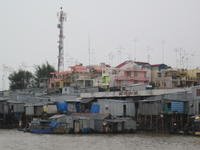 to a racer bicycle to the local bank. The bank seemed deserted until we spotted the clerk slumbering behind the counter in a deckchair. He wasn't happy to be disturbed and abruptly told us the bank was closed. We went back into the rain to find a hotel. We spent the afternoon wandering the sodden markets and exploring the island across the river. Further downstream, the island is home to a large Cham community, but we saw only one Cham man resplendent in white with a sage like straggly beard. We stood outside a colourful temple and listened to a hundred nuns chanting
to a racer bicycle to the local bank. The bank seemed deserted until we spotted the clerk slumbering behind the counter in a deckchair. He wasn't happy to be disturbed and abruptly told us the bank was closed. We went back into the rain to find a hotel. We spent the afternoon wandering the sodden markets and exploring the island across the river. Further downstream, the island is home to a large Cham community, but we saw only one Cham man resplendent in white with a sage like straggly beard. We stood outside a colourful temple and listened to a hundred nuns chanting
in unison. Back across the river we wound our way back to our room through flooded pungeant market stalls and fell into a deep sleep.
Monday
Straight after breakfast we caught another bicycle wagon to the holy Nui Sam (Sam Mountain). The bicycle was pedalled by a young sinewy man called Van who'd approached us next to a dessert cart the night before. Thereafter he appeared twice more. Later that night to advise us about the contents of steamed buns and again that Monday morning after breakfast. Persistance pays. Nui Sam is only striking because abruptly from the pancake flat rice fields around it. The holy site is covered with temples and pagodas. From the main Tay An Pagoda at the foot of Nui Sam we set off to the summit. Though the morning had been almost chilly, the sun had since emerged creating an intensely humid heat. It didn't take long for us to become drenched with sweat. Nimble footed Van, clothed in long pants, long shirt and thongs, skipped up the steps ahead of us. The summit trail wound steeply through minature alters, tombs, cave pagodas, small shops and settlements. Towards the top we stopped to wipe our faces with wet towels and recline in hammocks to take in the incredible view. From the summit we could see the town of Chau Doc with the river behind it flowing onwards to the heart of the Delta. To the south a small canal flowed through distant hills to the South China Sea.
Nui Sam is only striking because abruptly from the pancake flat rice fields around it. The holy site is covered with temples and pagodas. From the main Tay An Pagoda at the foot of Nui Sam we set off to the summit. Though the morning had been almost chilly, the sun had since emerged creating an intensely humid heat. It didn't take long for us to become drenched with sweat. Nimble footed Van, clothed in long pants, long shirt and thongs, skipped up the steps ahead of us. The summit trail wound steeply through minature alters, tombs, cave pagodas, small shops and settlements. Towards the top we stopped to wipe our faces with wet towels and recline in hammocks to take in the incredible view. From the summit we could see the town of Chau Doc with the river behind it flowing onwards to the heart of the Delta. To the south a small canal flowed through distant hills to the South China Sea.
All four of our legs were shaking from the exertion in the heat. After a quick steam and massage in a highway brothel we were sufficiently rejuvenated to depart Chau Doc and Van rode us to the bus station. For the princely sum of 22,500 dong (US$1.40) we were assured a small portion of the back row of a minibus bound for Cantho. For the initial minutes of our journey, before another passenger was rammed between us, we were seated next to a masked woman. Though modesty had prevented me from noticing, Nat drew my attention to some unusual bulges under the woman's dark loosely fitted clothes. Her waist and shoulders were heavily padded and at first i thought she was wearing some strangely configured back brace. Then we noticed that alarming bulge of her pants near feet. The woman was naturally diminuative so these Michelin Man antics aroused our curiousity.
Not far out of town we stopped outside of a small sunken shopfront where young girls shelled thousands of snails. The bus conducter rushed out and returned with three heavily packed rectangular bags which he shoved through the window next to my head without ceremony. The masked puff daddy beckoned for us to pass the bags to her. And so it was that we became accessories in what we were to learn was a cigarette smuggling racket.
Sharing three seats with three others (one of whom is bulging with tobacco) was never going to be comfortable. I had to keep shifting my weight between buttocks to stop one from falling asleep. But the changing cast of passengers of the minibus kept my mind occupied so it didn't have to dwell on matters corpural. As we reached the outskirts of Cantho, the other passengers began to eye the road suspiciously. If police were to stop our bus, they would fine the smugglers (a large proportion of us) heavily. The glances to the street became increasingly desperate as the bus lurched to a stop in front of a sprawling mechanic shop. The sliding door flew open to allow puffdaddy and her similarly inflated counterpart from the front of the bus to make a mad dash to greasy safety. An older woman, hithero discreet, exited with them and extolled them to run towards two men dancing from side to side at the rear of the shop. All the while the remaining passengers head's swivelled back and forth between the road and the shop. The woman stumbled and one fell under their awkward burdens, but soon made it inside the shop. As the did so our bus lurched away from the curb and hurtled back into the traffic. It was perhaps the most suspicious looking criminal operation i had ever witnessed.
Tuesday
We woke before five and were on the river besides Cantho as the sun began to filter through low lying clouds. Together with produce laden craft we glided towards the Caing Rai markets. We arrived in spectacular light. Dozens of boats (big colourful barges, and all types of long boats) bobbed with serene early morning calmness while their occupants amicably conducted commerce. Each boat specialised in only one or two types of produce. A barge might be filled with a three thousand pineapples or a small dugout would sit low in the water under the weight of a big pink pile of dragonfruit. Barges displayed their produce by tying samples to poles above their decks making it easy for customers to find what they are looking for.
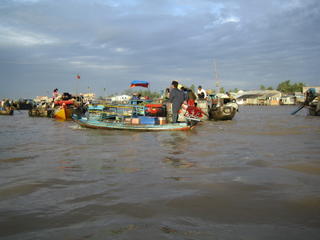
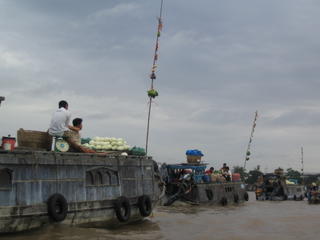

After drifting peacefully amongst the traders we pulled up next to a small boat selling hot coffee. As we sipped shots of sweet expresso, some men on a big barge opposite called over to us. "You are very handsome" our guide translated for us. And when i thanked them they began lobbing their sole produce item towards me - turnips. As i caught each one i kept it in my hands to discourage excessive generosity, but to no avail. My beauty was worth seven turnips that morning. They laughed at our counter-offer of bananas saying "we have these all the time".

Wednesday
We caught another crowded minibus to Vinh Long. At the Bassac ferry crossing all men, except me, left the bus, huddled together on the rain swept ferry deck and then reboarded the bus on the other side. I was happy to be exempted from this procedure despite the effeminate slur. The bus dropped us on the far outskirts of town and we caught a motorbike powered carriage to the docks near the central markets. Through tour agents and shady portside characters we made enquiries about getting to the offshore islands to stay with local families. We were quoted big prices for big tours and extortionate fees for safe passage across the Mekong. Then a woman in traditional clothes told us there was a passenger ferry to An Binh island on the opposite bank. After lunch we took the short journey across. It cost 500 dong (3 cents).
On the ferry we felt a little uneasy. We had no contacts, no addresses, no map and not even an idea where a willing family could be found. What if we couldn't find a family to stay with? We coud always catch the ferry back and start again we reasoned. As we disembarked it was one of the few times that we actually hoped to be hassled by people offering services. A motorbike taxi driver called out to us and i eyed him hesitantly. Then an older man stepped forward and used the precious word - "Homestay". That was how we met Chin who proceeded to guide us to his home amongst the fruit orchards. It was still raining after we'd settled into our room complete with bamboo mat. But Chin encouraged us to use his motorbike to explore the island. After our positive experience in Kratie we attempted to take him up on his offer.
At about 3pm that day two elderly men in conical hats were peacefully pedalling along the quiet main road that bisects the fruit orchards. Suddenly a manic foreigner in a bright blue shirt revved heavily up a sideramp and stopped in front of them. He then accelerated off the road, salling into a papaya tree and careering into the ditch below. I must have leapt from the bike before it ploughed into the dirt in the ditch below the road because aside from a few cuts to my leg i was unscathed. The bike was not so lucky. The whole family and Nat had followed my jerky trek along the narrow winding path to the road and were there to witness my folly. We dragged the bike back to the road and Chin's son rode it back home safely. Then we went for a tour of the island on the back of Chin's children's bikes instead! It was a great trip through lush plantations, across many streams, but i couldn't shake the feeling that the whole island had already learned about the accident. Whole groups of people on the side of the road would burst into laughter upon our approach. Young riders would pull up to us, glance meaningfully at the damaged bike, smile and accelerate ahead. I was content to play the fool.
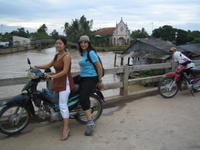
Thursday
After a tense but congenial negotiation about compensation for the bike we got rides to the top of the northern most island in the group. This was an epic motorbike road. We arrived at a small drinks stall that doubled as a ferry terminal and sipped coconuts until the ferry to Cai Be arrived. At Cai Be we walked through town without a plan until a tropical downpour pinned us down under market canopy. As the storm relented we caught motorbikes to the main highway and boarded a bus to Saigon.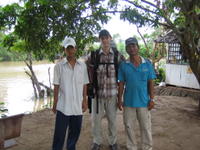
Thursday to Sunday
I enjoyed three days with Nat in Saigon. Great food, long tunnels, kissing parks, terrible masseuses, and friendly dogs. Then it was time for me to leave. The taxi waited while we said our undefined goodbyes. And then we were alone...